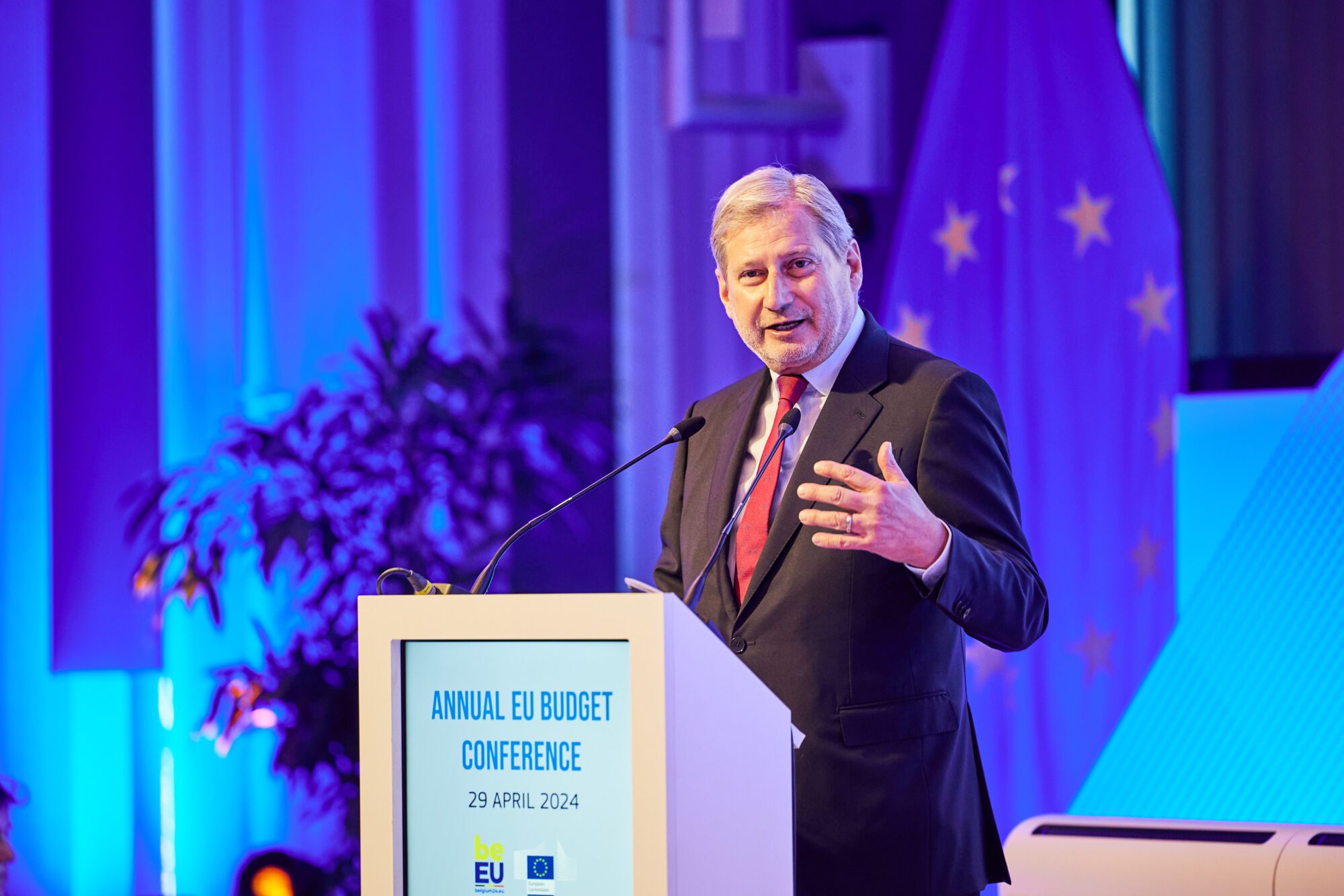
Johannes Hahn
Claudio Centonze/ European Union, 2024. Source: EC – Audiovisual Service
The EU’s next seven-year financial framework must be much more flexible to be able to finance “unforeseen” events of “historical significance,” EU Budget Commissioner Johannes Hahn stressed as the main message of his keynote speech at the EU’s annual budget conference in Brussels on Monday, April 29th.
Although the next multi-annual financial framework (MFF) won’t start until 2028, EU leaders and officials have convened to discuss reforming the bloc’s budgetary and spending rules to better accommodate a rapidly changing geopolitical environment.
The incoming college of commissioners—set to be established in the months following June’s EU elections—will have until June 2025 to present its first draft proposal for the 2028-3035 MFF, but “preparations start now,” Hahn said.
Shifting to war economy
The commissioner began by spelling out the number one priority that the future EU budget will need to focus on: security and defense, as well as the ability to address unforeseen geopolitical challenges.
“We must leave our comfort zone, as we can no longer leave European security largely in the hands of the U.S.,” Hahn said. The commissioner stressed that the EU must complement its established soft power techniques with a wide range of hard power abilities, including massive defense investments and joint procurements of military equipment.
According to Hahn, European nations need to understand that “business as usual is no longer an option” in the current geo-economic circumstances.
Furthermore, the EU needs to boost both its military readiness and economic competitiveness, as these will be essential to implementing the next phase of EU enlargement, including integrating Ukraine’s massive (and investment-hungry) economy.
“I am convinced that enlargement will be manageable from a budget point of view,” Hahn said addressing the increasing concerns about whether the EU can even afford Ukraine as a new member state.
What lessons can we draw from the current #MFF?
— Johannes Hahn (@JHahnEU) April 29, 2024
Let me highlight three key dimensions : spending, revenue and impact -drawing lessons for the future for a more resilient, agile and performant #EUBudget. 1/3 pic.twitter.com/a38Gte2L1A
EU taxes and more debt to come
As Hahn outlined, the next MFF will need to revolve around three key dimensions: spending, revenue, and impact.
First, EU spending rules must be reformed to allow a much more “agile and flexible” implementation of the funds, which would allow Brussels to swiftly respond to unforeseen events of “historical significance,” such as the war in Ukraine and the subsequent energy crisis, which forced Brussels to adopt a mid-term budget top-up earlier this year.
The commissioner noted that similar mid-term reviews might still be needed, and therefore should be incorporated in the planning as a regular instrument so that it would be easier to pass when the time comes.
Secondly, Hahn said that Europe must also forget the old principle that the EU budget cannot exceed 1% of the gross national income (GNI). Apart from the annual contributions from each member state, Brussels will need its “own revenues” (EU taxes for instance) to finance its geopolitical projects. More EU bonds and taking on further joint EU debt will be another key aspect of that, the commissioner added.
Financial blackmail: a feature, not a bug
Thirdly, the new MFF will need to come up with ways to have a larger impact for less money when implementing the budget, Hahn said, alluding to tying certain funds and payments to the completion of national reforms as opposed to using this option as punishment.
The “lessons learned” from the examples of Hungary and Poland is that “the impact of the Union budget could also be increased [by establishing] a broader link between EU spending and reforms and investments … over the entire lifetime of a [MFF],” the commissioner said.
In other words, by institutionalizing its occasional financial blackmail against sovereigntist member states that do not want to implement centrally dictated leftist policies, Brussels would effectively prevent drawn-out political deadlocks like we’ve seen this last term. The instrument would no longer need to be approved every time the Commission wants to use it, as implementing its liberal agenda will be a prerequisite to access certain funds by default.
In conclusion, Hahn said the EU must be “bold and innovative” when designing the new MFF, which, given all the ideas he described, means a lot more money to Brussels accompanied by a lot more power on how it would spend it by limiting the control—and therefore, sovereignty—of member states.
Nothing is set in stone, of course, as this is just the first day of a debate lasting three years, and budget tends to be the one thing that member states are most cautious about reforming. The Commission’s ideas, nonetheless, are helpful to approximate the direction of the debate—and even more reason to appoint a better college this summer.
Another challenge is the question how to maximise #impact.
— Johannes Hahn (@JHahnEU) April 29, 2024
Following the example of the Recovery and Resilience Fund #RRF, the impact of the #EUBudget could also be increased through a broader link btw. #EUspending and #reforms and #investments. 3/3
